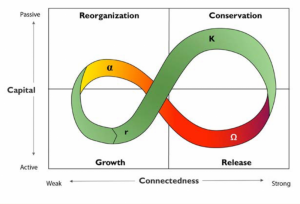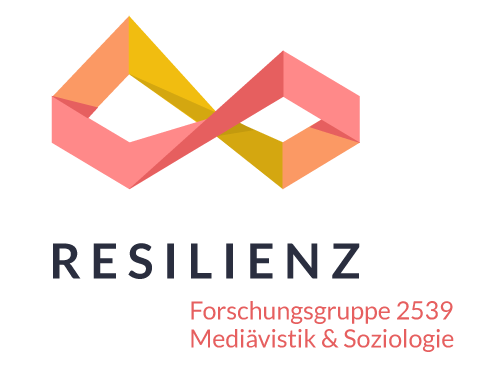Basic idea and starting point
Cultures and societies deal with existential challenges in different ways in view of their respective experiences, abilities and opportunities. In recent years, uprisings and civil wars, natural and nuclear disasters, the massive upheavals on the global financial markets and the refugee crisis have made it clear that one of the requirements of today’s society is to react flexibly to changes, to test new forms of knowledge and design and in this way to secure one’s own existence. Even if the framework conditions have changed, this phenomenon (as such) is by no means new: in the course of history there have always been times when the familiar order seemed to be out of balance in a special way.
The research group, in its first funding period (01.07.2016-30.06.2019) consisting of representatives of medieval studies (from the disciplines of history, legal history and German studies) and sociology, started at this point. By deliberately crossing epochal and disciplinary boundaries, it focused on the question of what enables actors and social units to react productively to upheavals or challenges that threaten their existence (see in detail the interview by Lukas Clemens and Martin Endreß in UniJournal, pp. 20-24).
A particularly suitable field of observation for an analysis oriented towards constellations of upheaval is the period from about 1250 onwards, the Late Middle Ages, in which different experiences of corruption were combined with an expansion of options for thought and action. The demographic, economic-social, political, ecclesiastical, religious and cultural upheavals, which occurred at different times and regions, are understood as phenomena of Europe-wide change. In contrast to this pattern of interpretation, more recent research, which —particularly in the course of the investigation of climatic conditions— is trying to reassess them, is on the other hand devoting more attention to contemporary perception and emphasising the adaptation measures of the centuries after 1250 in religion, politics, the economy and society.
The starting point of the research group in the first funding period was the assumption that the concept of resilience, which in the face of a presence marked by upheavals and interpreted as particularly crisis-ridden makes a ‚career‘ in scientific discourse and social debates, is particularly interesting for a comparison with the centuries after ca. 1250, generally labelled the Late Middle Ages and the beginning of the early modern era. In doing so, the research group intended to expand the analytical potential of the resilience concept (with its focus on disruptive events and situations of upheaval) to a historically comparative perspective by using cross-epoch studies of the period from ca. 1250 to ca. 1600 and thus open up innovative, forward-looking perspectives for the participating subjects.
Aim and cross-project key questions
The aim of the research group in the first funding period was to develop typologies in an innovative and so far unique way in order to record the processes of resilience, their duration, their temporal stratification, the options for action of the actors involved (their resilience strategies and dispositions) and the ideal and material resources that were used in these processes.
Six projects from the fields of sociology and medieval studies, represented by the departments of Older German Philology, History of Law and Medieval History (to the projects of the first funding period), participated in the research work in the first funding period.
The investigations in the projects followed three overarching guiding questions:
- Which ideas of coping, adaptation, or transformation enable which actors to stabilize, pass on, or maintain which social units in a long-term transforming manner beyond upheavals that threaten their existence?
- Which socio-political, socio-economic or socio-cultural resources prove to be beneficial for the productive processing of experienced or ex post reconstructed disruptive events?
- Which secondary consequences do resilience processes have in which temporal cycles for persistence and change directly or only indirectly by these affected social units?
Insights into the cross-project benefits
For the work of the research group in the first funding period, it can be summarised that the resilience analysis was identified as an extremely rich and productive heuristic for the investigation of non-linear socio-historical processes and was (further) developed in interdisciplinary cooperation between medieval studies and sociology. The focus was in particular on the transfer of socio-ecological models of resilience to socio-historical constellations and their proven value for the empirical projects of the research group.
In terms of the analytical benefits as well as the challenges identified in the process, which will be addressed and dealt with in the second funding period, the following can be summarised:

Source: Raford 2010 (http://noahraford.com/?p=648); Holling 1987: 145; Gunderson/Holling 2002: 34
- The resilience approach in general as well as the resilience-analytical models of the Adaptive Cycle and the Panarchy (see right) in particular could be exerted successfully for the investigation of socio-historical nonlinear processes and proved to be beneficial in the analysis of these processes – especially in terms of their connection. It could be shown that phenomena of continuity and discontinuity do not need to be understood as mutually exclusive opposites, but that only by linking them a clearer understanding of numerous complex socio-historical processes can be achieved. The resilience analytical concepts and models further developed by the research group proved to be extremely productive, especially due to the close connection of questions of processuality and (multi-level) relativity.
- A systematic approach to resilience processes was made possible by the typological differentiation between coping, adaptation and transformation potentials. With this differentiation, the research group focused in particular on the dialectical interaction of phenomena of continuity and discontinuity, which will be investigated more intensively in the second funding period.
- While transferring and further developing the resilience-analytical concepts and models, the socio-constructive perspective adopted by the research group proved to be a central element in avoiding narrowing the socio-ecological discourse. With the help of this perspective, contemporary perceptions of disruptive phenomena and points of transition and acceleration, as well as interpretations and attribution processes of resilience strategies, resilience dispositions and resilience resources could be productively reconstructed. According to this, this perspective will also be adopted and further strengthened in the second funding period.
- The typological differentiation of resilience strategies, resilience dispositions, and resilience resources enabled the research group to link action theory perspectives with structural theory perspectives, thus avoiding the respective analytical narrowings of the two classical resilience discourses – (developmental) psychology on the one hand, and social ecology on the other. With regard to the effects of resilience strategies, resilience dispositions and resilience resources across different analytical levels, which are to be understood panarchically, the investigation of secondary consequence dynamics proved to be particularly helpful.
- The interdisciplinary composition of the research group and the resulting close dialogue between medieval studies and sociology has proven to be helpful in many ways for the theoretical development and empirical examination of the resilience approach in the context of socio-historical processes. Thus, the respective focuses of the projects on resilience strategies, resilience dispositions and/or resilience resources made it possible to adopt different perspectives on resilience processes, starting from the socio-constructive perspective guiding the research group, and to compile these typologically in the overall perspective.
